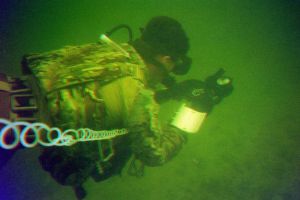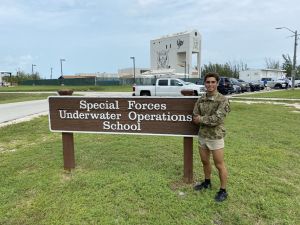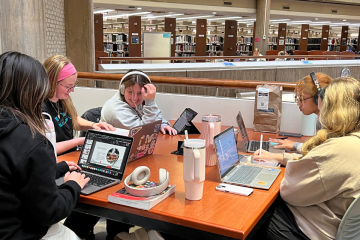Widener ROTC Cadet Reaches Elite Combat Diver Status

Some college students look to the summer months as a time to rest and recharge. Junior William Rodgers, a cadet in Widener’s Dauntless Battalion ROTC program, instead set his sights on something big.
Really big.
He became a certified combat diver through the U.S. Army’s Special Forces Combat Diver Qualification Course.
“If you want to prove yourself as one of the best in the world, that’s the course you push yourself to go to,” said Rodgers, a financial planning major. “This is the toughest course in the Army. It compares to Navy Seal school.”
Getting into the six-week course sounds almost as hard as completing it. The Freedom Brigade, in which the Dauntless Battalion belongs, could send one cadet. The brigade is made up of several hundred individuals who comprise 42 ROTC programs in the northeast. He earned the brigade nod by having a strong grade point average and fitness scores, and recommendations from the ROTC faculty at Widener. Rodgers secured the representation for Freedom Brigade in his freshman year, then COVID-19 canceled everything. He repeated the feat when he pursued and attained it again his sophomore year.
The nod gave him entry into pre-dive school, a Maritime Assessment Course at Joint Base Lewis-McChord in Washington state, held in June. He was one of five divers out of 21 in the two-and-a-half-week course to be validated and move on to Key West, Florida and the Special Forces Underwater Operations School. A total of 43 people began the course in Key West; 21 finished. Rodgers was one of them. He trained alongside other cadets, and Army officers. There were captains, sergeants, a lot of enlisted soldiers, and the first woman to pass the class. He trained with Army rangers and green berets, and was in pools or open water every day.
“The Combat Dive School is one of the toughest in the Army - on average 33 percent of elite soldiers who attempt to attain the Army's dive badge fail,” said Lieutenant Colonel James Pascoe, who leads the Dauntless Battalion. “William's success demonstrates an extremely high mental and physical resilience in keeping with the tradition of the cadets at Widener, stretching back through the service of the graduates of Pennsylvania Military College.”
The experience, and the qualifiers to reach it, are grueling. Rodgers ran nightly at Widener in his freshman and sophomore years, and incorporated breath-holding exercises after his runs to increase his ability to stay underwater longer, as he worked to attain the Freedom Brigade representation. He was up at 4 a.m. in the pre-dive course with more than 10 hours of daily training. In Key West, he endured underwater confidence testing: swimming 50 meters on a single breath, treading water for two minutes with his hands out of the water, swimming while wearing 16-pound weight belts around his waist, tying knots underwater, taking all his equipment off underwater, coming up for a breath, then going back down to put it all back on.
“Not only was it a physically demanding course, it was just as much mentally demanding,” Rodgers said. “You’re in your own head the entire time.”
Rodgers credited supportive friends and family who kept him motivated throughout the experience. David Gunther, who was lieutenant commander of the Dauntless Battalion when Rodgers was working to qualify for the course, was one of them. Gunther, who holds the combat diver badge after successfully completing the program in 2006, helped train Rodgers over the last two years – in the Widener pool. It was extra work for Gunther, who was also a professor of military science, and it epitomized the supportive mentor relationship Widener students experience with faculty and staff.
“It’s truly amazing that he did this,” Gunther said. “Roughly 6,000 cadets commission on an annual basis. Out of those, I would say less than a dozen earn this badge, or have this opportunity given to them. Knowing we were able to assist him in achieving that objective, it’s priceless. It’s why I’m here, to help develop these cadets.”
Rodgers said Gunther constantly affirmed his faith in him not just through the pool workouts, but by the way he talked. “He would say ‘when you get in to the course, not if you get in,’” Rodgers recalled. That helped build his confidence.
“That positive outlook, positive attitude, every chance you can look at a situation in a positive light, I think it will help you achieve the outcome you’re looking for,” Gunther said. “I told Billy, ‘You’ll leave Widener prepared and you’re going to do this. You’re going to get over every hurdle.’”
He did.
Rodgers is now in elite company, holding the dive badge. If the United States ever had a mission where the Army needed to infiltrate an area via the ocean, he is certified to swim to that objective. Rodgers grew up surfing and worked as a lifeguard in Ocean City, New Jersey. He knows what it means to be in harm’s way in the water. Now a junior, he’ll have to decide soon what kind of career to pursue once he’s commissioned as an Army officer. He came into Widener thinking he’d like to fly Army helicopters. Now he needs to decide whether he’ll chase that dream, or go toward infantry and use the dive certification.
“They don’t add up at all, those two career paths. That’s a choice I’ll have to make this year,” he said.
No matter what he decides, Rodgers thinks about how Gunther helped him, and wants to pay it forward.
“He wasn’t only the instructor. He was like a friend. I talk with him about my career goals, and it’s now my goal to train someone else to pass this course,” he said.





